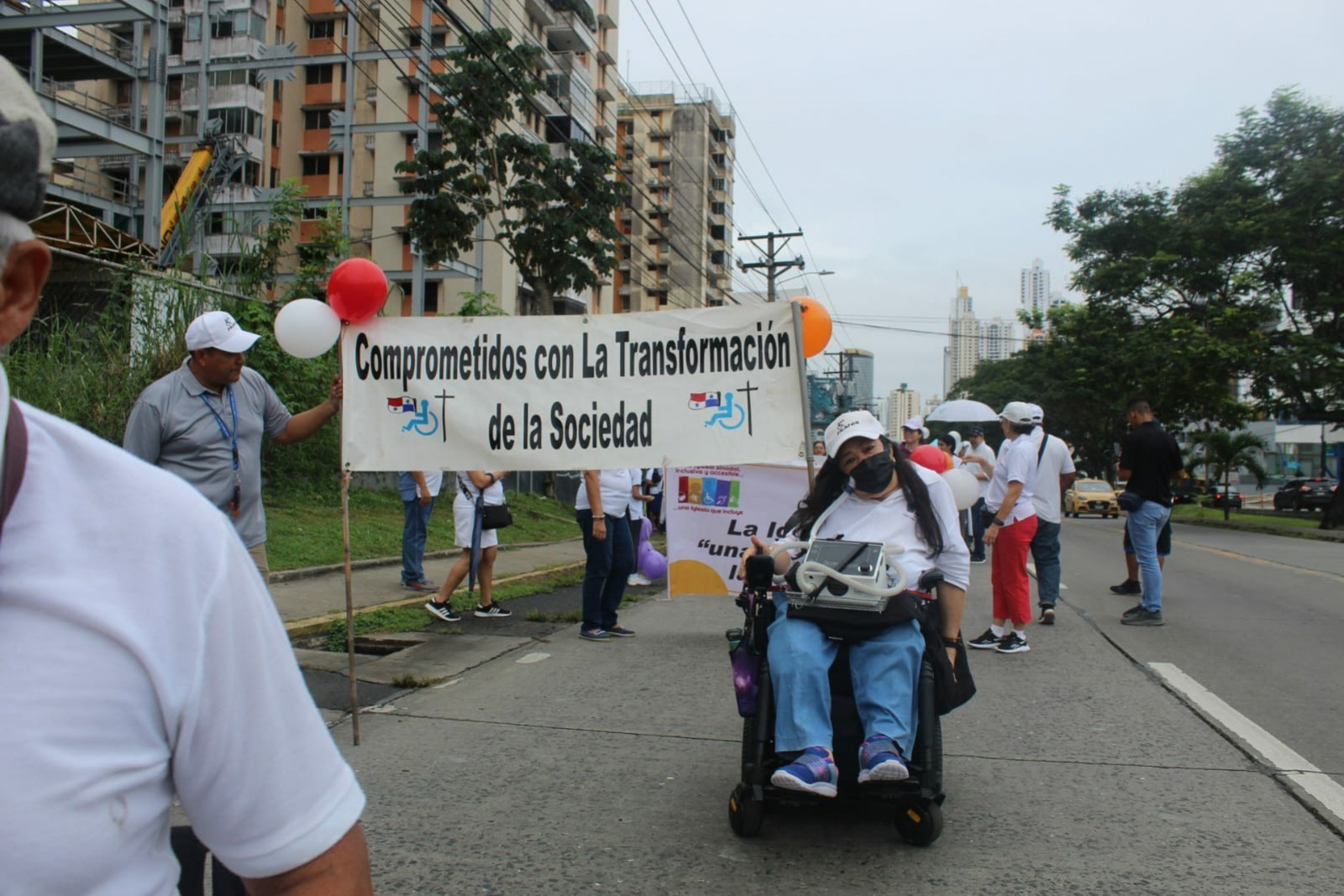
FRATER members participate in a march to promote the rights of people with disabilities in Panama.
SHARE
In recognition of the International Day of People with Disabilities, NDI is highlighting the essential work of partners who are at the forefront of fighting for greater levels of equality and organizing to shift social norms and perceptions and reduce barriers to political participation for persons with disabilities.
NDI interviewed FRATER, a partner advocating for the rights and equal opportunities for people with disabilities in all aspects of civic, political, social and economic life in Panama. FRATER explained how they are working to deconstruct barriers that limit access to political participation and advocate for compliance with the UN Convention on the Rights of Persons with Disabilities (CRPD), and other legal instruments protecting the rights of people with disabilities in Panama.
What does inclusion in civic and political life mean to you/your organization?
Inclusion means that people with disabilities are part of and participate in society, acknowledging their disabilities and guaranteeing that they have all the same opportunities to participate in all aspects of life to the fullest extent of their capacity and choices. It also means that people with disabilities can decide how they want to participate in society and political life, that they can exercise their right to vote, and be elected to office.
What motivates you to be an active and engaged citizen?
Recognizing that we are citizens with duties and rights, we are responsible for constructing an inclusive society. We are agents of change facing a society that discriminates and, as such, does not offer equity or equal opportunities.
Describe some of the ways that people with disabilities in your country are participating politically. What challenges or barriers to political participation remain?
In Panama, people with disabilities participate, when possible, in the formation of public policies around disability. We advocate for compliance with legislation and policies that guarantee rights for people with disabilities and promote their social participation. Some people with disabilities also run for office as delegates and representatives and become state officials. People with disabilities in Panama are also participating politically in the Commission for Equalization of Opportunities of Political Parties.
Lack of communication access and sign language interpreters is a persistent barrier to political participation for people with auditory disabilities. Another barrier for people with different types of disabilities is the lack of quality education and provisions of reasonable accommodations in schools when needed. Despite the existence of laws that guarantee universal design and physical access to schools, offices, and community life in general, gaps in the implementation of these laws create barriers to participation for people with disabilities. Poor access to transportation is another common barrier experienced by people with disabilities in Panama.
All of these barriers prevent access and employment opportunities, which limits the autonomy of people with disabilities to participate in social and political life and have equal opportunities.
How is your organization working to address these barriers/challenges and to eliminate discrimination against people with disabilities in your country?
FRATER participates as much as possible in all instances that need disability policies. We organize education campaigns to sensitize society about disability rights through workshops, training, and media such as radio, television and social media. FRATER also advocates for compliance with existing laws impacting people with disabilities.
In the past year, can you briefly share a success from your organization’s contribution to strengthening the disabled persons movement?
Through capacity building and education workshops, FRATER has been able to train new leaders and strengthen the skills of our disabled persons organization (DPO) members. These activities have focused on developing educational tools for self-advocacy, personal and self-esteem development and strategic planning. FRATER also disseminated legislation that protects the rights of people with disabilities and raised awareness among its members about how to advocate politically. FRATER has organized digital literacy classes for people with disabilities and workshops on how to create an impact in communications media and social networks.
FRATER emphasizes inclusion throughout all of its activities, ensuring that they are accessible to people with different types of disabilities, including auditory, visual, physical and psychosocial disabilities. FRATER also ensures that its workshops are taught by leaders and professionals with different types of disabilities.
What impact has NDI’s partnership had on your organization?
NDI’s initiative and technical support have been vital for the development and growth of the disability movement and for the development of new leadership. During our first award, we were able to provide digital literacy courses during the COVID-19 pandemic, and we used this as a vehicle to take our workshops to the national level. During our second award, we created avenues of joint work between DPOs virtually and in person to better come together in defense of the dignity and rights of people with disabilities, with greater awareness of their duties and rights as citizens. By including other human rights movements and universities, FRATER has also created new allies in our work.
Related Stories:
Partner Profile: Project Inclusion Network
ERA fund: Making Democracy Accessible to All
From “Nothing About Us Without Us” To “Nothing Without Us”
###
NDI is a non-profit, non-partisan, non-governmental organization that works in partnership around the world to strengthen and safeguard democratic institutions, processes, norms and values to secure a better quality of life for all. NDI envisions a world where democracy and freedom prevail, with dignity for all.


